Introduction
Dental caries, commonly known as cavities, are one of the most prevalent oral health issues worldwide. They are small holes or decay in the teeth caused by tooth decay, a process that occurs when sugars from the foods we eat mix with bacteria in our mouths. This mixture produces acids that eat away at the tooth’s surface, leading to the formation of cavities. If left untreated, these cavities can become deeper and lead to pain, infection, and even tooth loss.
Who is at Risk?
Dental caries can affect anyone at any age. This makes it essential to maintain a healthy diet, practice regular oral hygiene, and visit your dentist regularly for check-ups. Prevention is always better than treatment when it comes to oral health.
Maintaining a Healthy Smile
Preventive care doesn’t stop at the dentist’s office. Maintaining a healthy smile requires a commitment to daily oral hygiene, regular dental visits, and making smart dietary choices. By taking these steps, you can reduce your risk of cavities and enjoy a lifetime of strong, healthy teeth.
Education is also vital in preventing dental caries. Understanding how cavities form and the importance of early treatment can empower you to take better care of your teeth. Talk to your dentist if you have any questions about your oral health or need advice on how to improve your dental care routine.
Advancements in dental care are continually improving the ways we prevent and treat dental caries. With the right knowledge and tools, you can stay ahead of tooth decay and keep your smile bright. Remember, the best way to fight cavities is to prevent them from forming in the first place.
Diet and Dental Health
Diet plays a significant role in preventing cavities. Limiting sugary and acidic foods, such as candy, soda, packaged fruit juices and sticky chocolates can reduce your risk of developing cavities. These foods contribute to the creation of acids that weaken the enamel of your teeth, making them more susceptible to decay.
What Causes Dental Caries?
One of the key factors in the development of dental caries is plaque - a sticky film of bacteria that forms on our teeth. Plaque can harden into tartar, which is more difficult to remove by brushing and can contribute to further decay and affect the health of the gums too. Good oral hygiene is essential to keeping plaque and tartar at bay.
Prevention of Dental Caries
Preventing dental caries starts with good oral hygiene. Brushing your teeth at least twice a day with fluoride toothpaste, flossing daily in essential areas can help remove plaque and reduce bacteria. These simple steps are your first line of defense against cavities.
Fluoride helps to harden tooth enamel, making it more resistant to decay. Without enough fluoride, the teeth can be softer and weaker, leading to a higher chance of developing cavities. Some people may also benefit from professional fluoride treatments offered by their dentist.
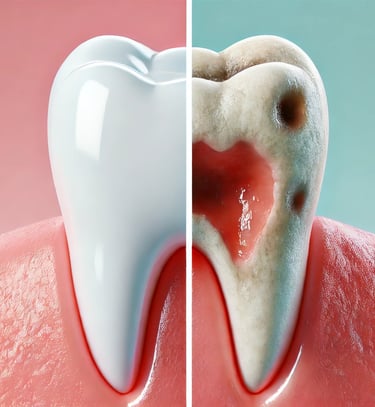

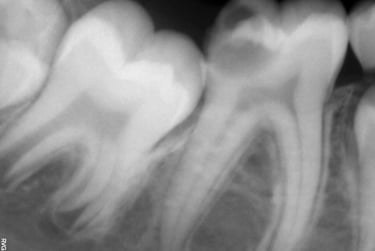

X Ray above and Photo below showing dental caries on the lower 1st molar of a 10 year old.
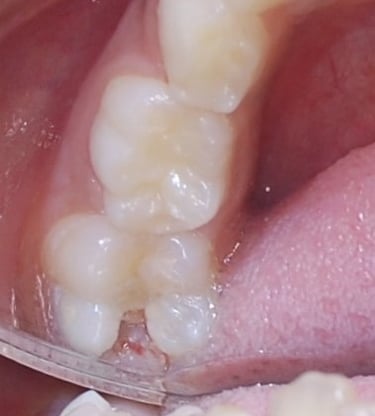

Dental Caries
Self Check
One can identify early tooth decay by closely inspecting the surfaces of the teeth to check for any obvious discolouration
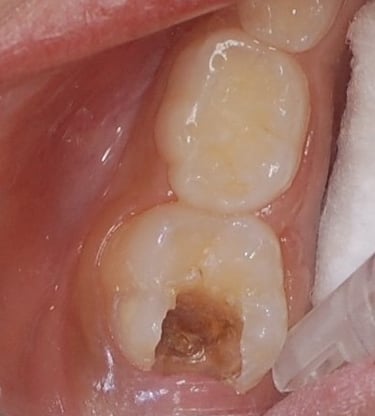

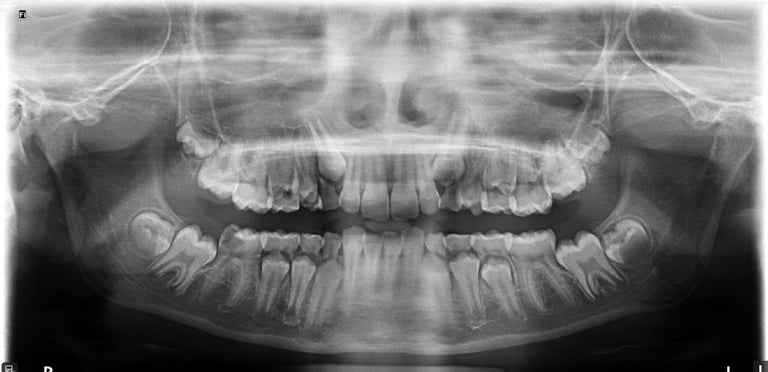

After removing Decay
X Ray / OPG showing deep caries in lower right 1st permanent Molar
esmile.in
esmile.in
esmile.in
esmile.in
esmile.in




